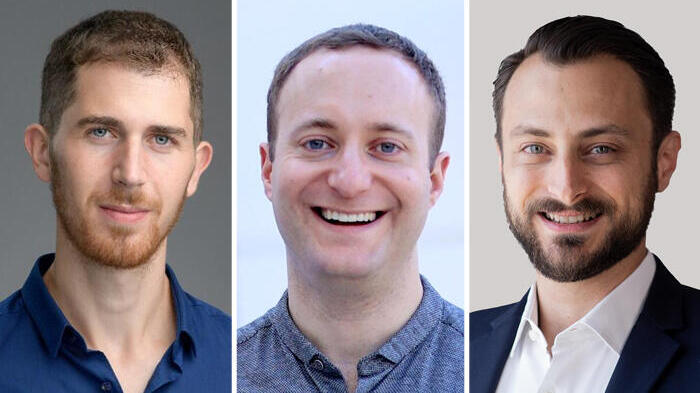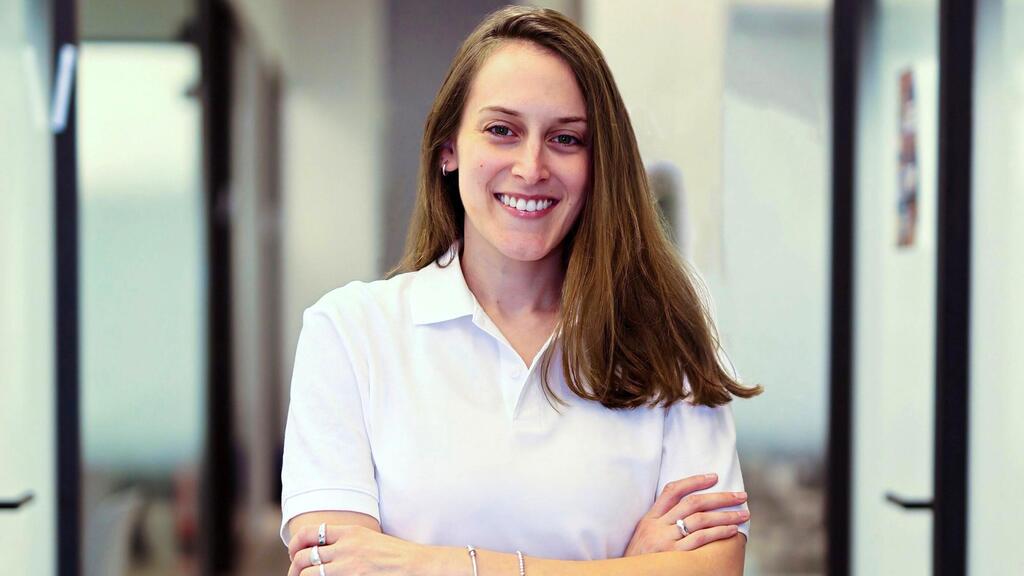“Quantum computers are not meant to take the problems that we solve today and solve them 10 or 100 times faster… they’re meant to take the problems that today we consider as completely impossible and make them possible,” explains Dr. Itamar Sivan, CEO and Co-Founder of Quantum Machines, the first and biggest quantum computing company in Israel, and among the largest quantum companies in the world. “That’s a very big difference,” he adds.
Much like the quiet revolution of artificial intelligence that instated its viability and disrupted the world seemingly overnight, quantum computing is almost certainly the next decades-long “overnight success,” poised to usher in an entirely new era of information processing. And far sooner than we may think.
2 View gallery


Nir Minerbi, Professor Serge Rosenblum, Dr. Iamar Sivan
(Credit: Classiq Technologies, QuamCore, Quantum Machines)
The rising traction surrounding the quantum sector feels prescient, as the 2025 Nobel Prize in Physics was awarded to John Clarke, Michel Devoret, and John Martinis for discoveries made in the 1980s that proved macroscopic quantum tunneling and the quantization of energy in an electrical circuit, which are the foundations of today’s quantum computing revolution.
For Professor Serge Rosenblum, Chief Scientist at quantum computing technology company QuamCore and Assistant Professor at the Weizmann Institute of Science, the Prize represents “a stamp of approval for this technology… It reinforces superconducting quantum computing as the leading technology toward building these machines.”
Perhaps it also serves as a reminder of the lifespan that truly transformative deep-tech technologies take to mature. For quantum, the question is no longer about the tech itself but about where it sits in the journey toward market readiness, as Sivan explains. “Let me be clear. People sometimes ask, ‘When will quantum computers work?’ Well, they do… today, we have working quantum computers,” he says.
“The big thing we’re waiting for is commercially useful use cases… and I think we’ll see that in the next couple of years.”
“Indeed, the motivation for quantum computing is not new,” says Nir Minerbi, CEO of ClassiQ Technologies, another Israeli startup and, as the world’s largest company solely dedicated to quantum software, a major player in the burgeoning field. He believes the realisation of this inflection point will be “a once-in-a-century revolution.” “It took a significant time and great efforts to be where we are today, right on the cusp of this new era in computing,” he says.
On the global stage, we can see this inflection point already beginning to play out. On 23 October, Google CEO Sundar Pichai announced a major quantum breakthrough for the company, with its Willow chip achieving the first-ever verifiable quantum advantage. Published in Nature, the new algorithm, named Quantum Echoes, ran 13,000 times faster than one of the world’s leading supercomputers.
“This new algorithm can explain interactions between atoms in a molecule using nuclear magnetic resonance, paving a path towards potential future uses in drug discovery and materials science,” Pichai wrote on X.
Locally, Ayalon Highways and Israeli startup Quantum Art recently unveiled plans for a pilot to optimize traffic in Israel using quantum algorithms for the real-time management of traffic lights. The initiative is the first of its kind in Israel and among the first globally to apply quantum computing to urban planning.
These examples help to satisfy the broader questions that all this progress is building toward. Who are the customers for the services of these quantum startups; the target audience as quantum tech moves toward real-world application?
According to Sivan, Quantum Machines, which develops complete solutions for the control and operation of quantum computers, has “hundreds of customers, all of which are really pushing the envelope to develop these full-scale quantum computers that will bring this very disruptive revolution in computing.” He continues, “Our customers span most of the organizations globally that develop quantum computers, whether these are big tech companies, national labs all over the world, startups, universities and so on.”
“Anyone that is using classical computers, at some point will use quantum computers. This is a huge market,” adds Minerbi. For ClassiQ, which develops the operating system that allows organizations to build and run applications on any quantum computer, its customers include “the biggest enterprises globally,” according to Minerbi. “These are BMW, Comcast, SoftBank, HSBC and Toshiba, and any large industry in pharma, automotive, aerospace, defense, finance, government. Also academia, of course.”
He adds that ClassiQ is already working with “hundreds of academic institutions, governments and basically anyone that looks to develop applications that will run on these computers.”
At a macro level, when it comes to the tech giants and other large-scale internationals that are potential buyers of startups in the quantum field, “it’s the same usual suspects as in computing broadly and AI,” says Sivan. “The leaders in the field are just like in classical computing – Google and Amazon, Microsoft and other big techs.”
“I think the set is very large,” Minerbi adds, echoing the tech giants including Google, Microsoft, Amazon, Nvidia, Intel and IBM. “But also newcomers, tech giants that are not yet in quantum, like Oracle or AMD and so on.”
Meanwhile, Rosenblum, who similarly identifies Big Tech and semiconductor firms as the hyperscalers in the field, believes future acquirers will extend beyond these to include defense and industrial powerhouses such as Honeywell (Quantinuum), Lockheed Martin and Siemens.
2 View gallery


Noga Yaari
(Photo: Maayan Rahima)
It follows, then, that deep-tech investors championing the startups driving the sector forward are steadfast in their belief in the field’s long-term, yet ever more imminent, return potential. “The field is at a tipping point – science is mature, real-world applications are emerging, and governments and enterprises are investing heavily,” says Dana Taigman Koren, Managing Partner at Q Fund, which backs quantum companies including Qedma and Rosenblum’s QuamCore. “For investors, this is the moment to back technologies that will shape the next decades.”
According to Noga Yaari, VP of Business Development at Earth & Beyond Ventures, another backer of QuamCore, “the market already sees quantum as one of the most promising frontiers in computing.” She adds, “The Nobel Prize gives more confidence, it validates that the science is solid and that quantum is here to stay.”
Koren likewise agrees that the Nobel Prize “validates quantum tech scientifically and commercially.”
In Israel, she points out, the country “has emerged as a global leader in quantum technology, building strength across both hardware and software.” Yet even amid a strong tech ecosystem and growing deep-tech breakthroughs, she cautions, “deep-tech funding is still limited.”
At the same time, Yaari expresses confidence that local conditions continue to make headway, with “deep-tech funding improving fast.” She attributes the momentum surrounding Israel’s quantum sector to the growing strength of “more dedicated funds, stronger corporate involvement and some government support,” namely government bodies like the Israel Innovation Authority.
Looking forward, while the country was arguably late to the arms race of artificial intelligence, when it comes to quantum, Minerbi asserts that Israel has a window of opportunity to cement its lead, but warns the foothold is not a guarantee.
“We need to leverage the current situation,” he says. “If we do it the right way, it will be significant in the future. But if we don’t play right, we could lose this position.”

